Unit 8 课堂笔记
人教版英语八年级上册Unit8【重点短语+词法语法句法精讲】
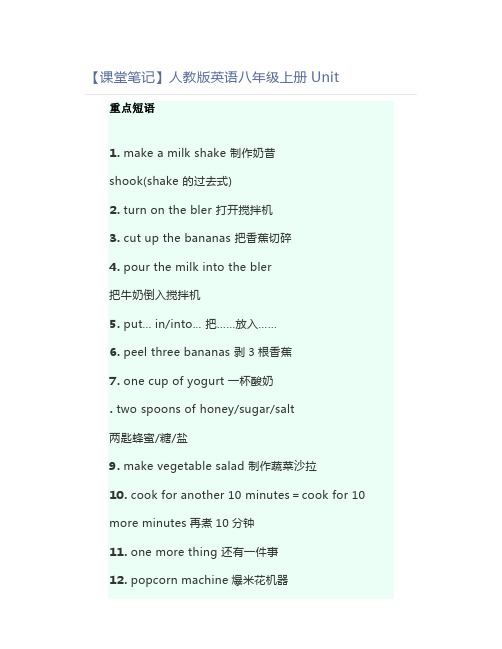
【课堂笔记】人教版英语八年级上册Unit 重点短语1. make a milk shake 制作奶昔shook(shake 的过去式)2. turn on the bler 打开搅拌机3. cut up the bananas 把香蕉切碎4. pour the milk into the bler把牛奶倒入搅拌机5. put... in/into... 把……放入……6. peel three bananas 剥3根香蕉7. one cup of yogurt 一杯酸奶. two spoons of honey/sugar/salt两匙蜂蜜/糖/盐9. make vegetable salad 制作蔬菜沙拉10. cook for another 10 minutes=cook for 10more minutes再煮10分钟11. one more thing 还有一件事12. popcorn machine爆米花机器13. dig a hole 挖洞dug; digging(dig的过去式以及现在分词) 14. take out a book from the library从图书馆借书15. put butter on a piece of bread把黄油涂在一片面包上16. the most traditional food 最传统的食物17. on the fourth Thursday in November 在十一月第四个星期四1. add... to... 把……加到……19. mashed potatoes 土豆泥20. pumpkin pie 南瓜饼21. the main dish of the meal 一餐的主菜22. fill... with... 用……把……装满23. place... on... 把……放在……上24. cover... with... 用……覆盖……25. cut... into thin pieces把……切成薄片26. serve it to your fris用它来款待你的朋友们27. cook it at a very high temperature以高温烹饪2. to make this special food为了制作这特别的食物29. a pot of hot soup 一锅热汤30. one by one 一个接一个重点句型1. How many bananas do we need?我们需要多少根香蕉?2. How much yogurt do we need?我们需要多少酸奶?3. I want to make Russian soup for a party on Saturday. 我想为周六的派对做罗宋汤。
人教新目标七年级英语下册课堂笔记Unit 8 Is there a post office near here

1. post n. 邮政There is a post office near my house.❍近:mail邮政;邮件❍post card明信片❍postv.邮寄;张贴;公布2. office n. 办公室My father is reading newspapers in his office.❍in the office在办公室里❍in office执政❍post office邮局❍officer军官;政府官员3. police n. 警察Most police wear uniforms❍集合名词,谓语用复数❍police station警察局❍近:cop警察;警官❍policeman(男)警察❍policewoman(女)警察4. hotel n. 旅馆;酒店He stays at this hotel for two days.❍five-star hotel五星级酒店❍family hotel家庭旅馆5. restaurant n. 餐馆There are lots of restaurants in our town.fast food restaurant速食店6. bank n. 银行The bank is on the other side of the road.bank岸;堤7. hospital n. 医院We have to send the old man to a hospital.❍in hospital住院❍in the hospital在医院里8. street n. 大街There are a lot of people in/on the street today.❍近:road公路;马路;大道❍in the street/on the street在大街上9. pay v.&n. 付费How much shall I pay for the bike?❍pay for为……付款❍pay phone付费电话10. near prep. 在……附近There are some trees near the river.❍近:beside在……旁边❍nearadj.近的;接近的adv.附近;几乎11. across adv. & prep. 过;穿过You can’t run across the road.Can you jump across?across from在……对面12. front n. 前面My sister sits in the front of the car.❍反:back后面❍in front of在……前面13. behind prep. 在……后面There is a ball behind me.behindprep.落后于adv.在后面;向后14. town n. 镇;市镇My grandparents live in a small town.❍in town在城里❍out of town在城外❍country农村,乡村❍city城市15. around prep. 在……周围adv. 在周围;大约The earth always moves around the sun.I can see some people around.❍近:about到处,处处❍look around环顾四周❍show sb.around带领某人参观16. north n. 北方;北方adj. 北方的The north of China is very cold in winter.❍north向北,朝北❍northern北方的❍south南方❍west西方❍east东方1. along prep. 沿着Go along this street.❍近:down沿着❍go/walk along沿着……走❍Alongadv.向前;一起2. turn v. 转向;翻He turns to the window.turning转弯处3. right adv. 向右边n. 右边His son is on his right.❍反:left向左边;左边❍turn right向右转❍on the right在右边❍rightadj.正确的;适当的;右边的4. left adv. 向左边n. 左边People drive on the left in England.❍反:right向右边;右边❍turn left向左转❍on the left在左边❍leftadj.左边的5. crossing n. 十字路口Turn left at the second crossing.❍crossv.穿过❍acrossprep.穿过6. neighborhood n. 街区;街坊This neighborhood is quite quiet.❍in the neighborhood在附近❍in the neighborhood of…在……的附近❍neighbor邻居7. spend v. 花(时间、钱等)I want to spend 100 yuan on this coat.❍近:cost花费pay付费❍spend time花时间8. climb v. 爬Let’s climb the hill!clime the tree爬树9. road n. 路You should walk on the right side of the road.All roads lead to Rome.条条大路通罗马.10. often adv. 时常,常常,经常I often do my homework after school.usually通常11. air n. 空气We can’t live without air.❍in the air在空中❍by air乘飞机12. sunshine n. 阳光Don’t read in the sunshine.❍sun太阳❍shine光亮13. free adj. 免费的Your fruit is free.❍for free免费地❍free自由的;空闲的14. enjoy v. 享受;喜爱I really enjoy watching movies with my friends.enjoy oneself玩得开心;过得愉快15. easily adv. 容易地A cold can easily cause a cough.easy容易的16. money n. 钱How much money do you have?❍make money赚钱❍save money攒钱❍pocket money零用钱❍lucky money压岁钱;红包1. Is there a hospital near here?这附近有医院吗?2. The pay phone is across from the library.付费电话在图书馆对面。
初中英语课堂笔记初三九年级全一册 Unit7 Unit8

课堂笔记初三九年级全一册Unit 7Teenagers should be allowed tochoose their own clothes.★重点单词l.smoke. v.冒烟;吸烟n.烟2.pierce v.^L;刺破;穿透3.license (=licence)证;证件4.safety n.安全;安全性.earring n.耳环;耳饰5.cryv.&n.哭;叫喊.fieldn.田野;场地6.hug n.& v.拥抱;搂抱.lift v.举起;抬高7.support v.& n.支持.awful adj.很坏的;讨厌的11.teen n.十几岁(十三至十九岁之间).regret v.感到遗憾;懊悔12.poem n.诗;韵文.bedroom n.卧室munity n.社区;社团.enter v.进来;进去14.chance n.机会;可能性.professional adj.职业的;专业的15.manage v.完成(困难的事);应付(困难局面).society n.社会22.unit n.单位;单元.educate v.教育;教导★重点短语be allowed to do sth被允许做某事1.sixteen-year-olds 16 岁的青少年get one's ears pierced 穿耳洞2.cut one's hair 理发be excited about 对感到兴奋e a flash使用闪光灯talk back 顶嘴4.regret doing sth.后悔做某事make one's own decision 自己做决定5.keep ... away from 避免接近;远离manage one's ownlife管理自己的生活6.fail a test测验不及格be strict with 对要求严格7.get in the way of 挡的路;妨碍worry about 担心8.achieve one's dream实现某人的理想think about 考虑9.have nothing against sb./sth.对某人 / 某物不反感endup as.最终成为10.be serious about.对是认真的★重点句型1.1d on't think twelw-year-olds should be allowed to get their ears pierced.我认为不应该允许12岁的孩子穿耳孔。
2009年自考英语(一)课堂笔记(unit8)
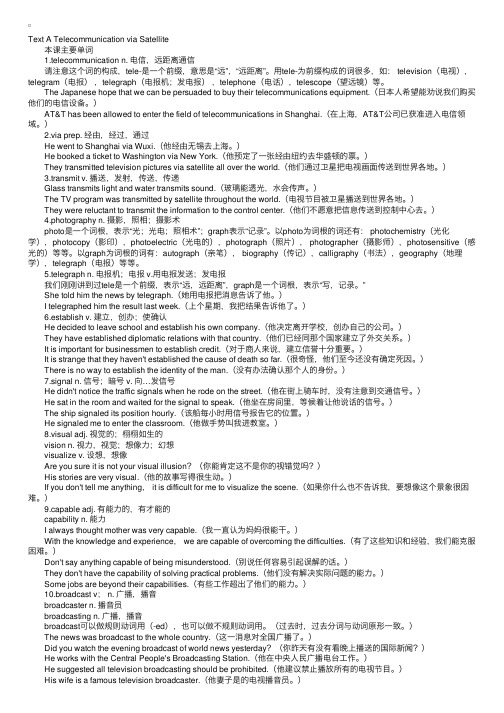
Text A Telecommunication via Satellite 本课主要单词 1.telecommunication n. 电信,远距离通信 请注意这个词的构成,tele-是⼀个前缀,意思是“远”,“远距离”。
⽤tele-为前缀构成的词很多,如: television(电视),telegram(电报),telegraph(电报机;发电报),telephone(电话),telescope(望远镜)等。
The Japanese hope that we can be persuaded to buy their telecommunications equipment.(⽇本⼈希望能劝说我们购买他们的电信设备。
) AT&T has been allowed to enter the field of telecommunications in Shanghai.(在上海,AT&T公司已获准进⼊电信领域。
) 2.via prep. 经由,经过,通过 He went to Shanghai via Wuxi.(他经由⽆锡去上海。
) He booked a ticket to Washington via New York.(他预定了⼀张经由纽约去华盛顿的票。
) They transmitted television pictures via satellite all over the world.(他们通过卫星把电视画⾯传送到世界各地。
) 3.transmit v. 播送,发射,传送,传递 Glass transmits light and water transmits sound.(玻璃能透光,⽔会传声。
) The TV program was transmitted by satellite throughout the world.(电视节⽬被卫星播送到世界各地。
七年级上册英语笔记第八单元

七年级上册英语笔记第八单元以下是一个可能的七年级上册英语第八单元的笔记。
请注意,具体的课程内容可能会因教材版本和教师的教学方法而有所不同。
七年级上册英语第八单元笔记主题:节日和庆祝活动重点词汇:节日 - festival庆祝 - celebrate春节 - Spring Festival国庆节 - National Day感恩节 - Thanksgiving万圣节 - Halloween圣诞节 - Christmas礼物 - present灯笼 - lantern焰火 - fireworks重点语法:1. 现在进行时(Present Continuous Tense):描述正在进行的动作。
结构为“be + 动词的现在分词”。
例如:I am celebrating the festival.(我正在庆祝节日。
)2. 特殊疑问句:以特殊疑问词(如what, where, when等)开头,后接一般疑问句。
例如:When are you celebrating the festival?(你们什么时候庆祝节日?)重要句子:1. We usually have a big family dinner on the Spring Festival.(春节时,我们通常会有一顿丰盛的家庭晚餐。
)2. National Day is on October 1st.(国庆节是10月1日。
)3. On Thanksgiving, people usually eat turkey and pumpkin pie.(在感恩节,人们通常吃火鸡和南瓜派。
)4. Halloween is a day for children to dress up and trick-or-treat.(万圣节是孩子们化妆和捣蛋要糖果的日子。
)5. On Christmas, people usually give presents to each other.(在圣诞节,人们通常互赠礼物。
八年级上册英语第8单元笔记

八年级上册英语第8单元笔记
以下是八年级上册英语第8单元的笔记,涵盖了本单元的重点词汇、短语、句型和语法知识点:
1. 重点词汇:
hurt 伤害,受伤
ankle 脚踝
knee 膝盖
elbow 肘部
head 头
cut 割伤,切伤
hurt oneself 受伤
2. 重点短语:
go to the hospital 去医院
be careful 当心,小心
be careful not to do sth. 当心不要做某事
be careful with sth. 对某事小心
3. 重点句型:
I hope you feel better soon. 我希望你很快好起来。
Don’t worry. It’s not serious. 别担心,不严重。
What should you do if you cut yourself? 如果割伤了自己,你应该怎么做?
4. 语法知识点:
现在进行时表示正在进行的动作或正在发生的事情,结构为“be + -ing”。
现在进行时的否定形式是在be动词后面加not,例如“I am not doing my homework”。
现在进行时的一般疑问句形式是在be动词前面加助动词“Are”,例如“Are you doing your homework?”。
5. 学习建议:
多听录音,模仿发音和语调。
多做笔记,积累词汇和短语。
多练习写作和口语,提高语言表达能力。
注意语法规则和句子结构,避免出现错误。
译林版英语书六年级上册第八单元课堂笔记

译林版英语书六年级上册第八单元课堂笔记一、重点单词1.taste 尝起来2.feel 感觉起来3.sound 听起来4.look 看起来5.smell 闻起来二、重点短语1.look at 看着2.sound like 听起来像3.feel like 感觉像4.taste like 尝起来像5.smell like 闻起来像三、重点句型1.What does it look like? 它看起来像什么?2.What does it sound like? 它听起来像什么?3.What does it feel like? 它感觉起来像什么?4.What does it taste like? 它尝起来像什么?5.What does it smell like? 它闻起来像什么?四、重点语法1.现在进行时的基本结构:主语+ be动词(am/is/are)+ 动词ing形式。
表示正在进行的动作或状态。
例如:I am writing a letter. 我正在写一封信。
2.现在进行时的肯定句、否定句和疑问句的变换方式与一般现在时相同,只是在be动词后加动词ing形式。
例如:I am not playing basketball. 我没有在打篮球。
Are you listening to music? 你正在听音乐吗?3.现在进行时的特殊疑问句,例如:What are you doing now? 你现在正在做什么?How are you feeling now? 你现在感觉怎么样?When are you going to finish your homework? 你打算什么时候完成你的作业?等。
剑桥少儿英语二级unit8
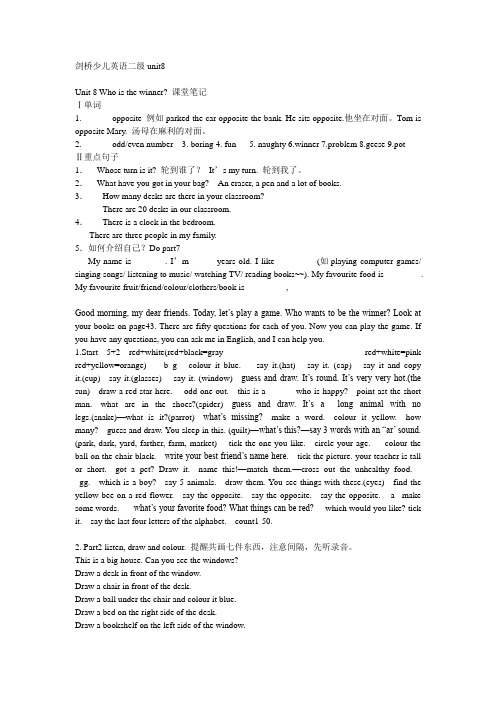
剑桥少儿英语二级unit8Unit 8 Who is the winner? 课堂笔记Ⅰ单词1. opposite 例如parked the car opposite the bank. He sits opposite.他坐在对面。
Tom is opposite Mary. 汤母在麻利的对面。
2. odd/even number3. boring4. fun5. naughty6.winner7.problem8.geese9.potⅡ重点句子1.Whose turn is it? 轮到谁了?It’s my turn. 轮到我了。
2.What have you got in your bag? An eraser, a pen and a lot of books.3.-----How many desks are there in your classroom?-----There are 20 desks in our classroom.4.-----There is a clock in the bedroom.-----There are three people in my family.5.如何介绍自己?Do part7My name is _______. I’m _____ years old. I like _________(如playing computer games/ singing songs/ listening to music/ watching TV/ reading books~~). My favourite food is ________. My favourite fruit/friend/colour/clothers/book is _________,Good morning, my dear friends. Today, let’s play a game. Who wants to be the winner? Look at your books on page43. There are fifty questions for each of you. Now you can play the game. If you have any questions, you can ask me in English, and I can help you.1.Start---5+2---red+white(red+black=gray red+white=pink red+yellow=orange)------b_g----colour it blue.---- say it.(hat)----say it. (cap)----say it and copy it.(cup)---say it.(glasses)--- say it. (window)---guess and draw. It’s round. It’s very very hot.(the sun)---draw a red star here.----odd one out.---this is a ___-----who is happy?---point ast the short man.---what are in the shoes?(spider)---guess and draw. It’s a long animal with no legs.(snake)—what is it?(parrot)---what’s missing?---make a word.---colour it yellow.---how many?---guess and draw. You sleep in this. (quilt)—what’s this?—say 3 words with an “ar’ sound. (park, dark, yard, farther, farm, market)----tick the one you like.---circle your age.-----colour the ball on the chair black.---write your best friend’s name here.---tick the picture. your teacher is tall or short.---got a pet? Draw it.---name this!—match them.—cross out the unhealthy food.--- _gg.---which is a boy?---say 5 animals.---draw them. You see things with these.(eyes)---find the yellow bee on a red flower.---say the opposite.---say the opposite.---say the opposite.--_a_ make some words.-----what’s your favorite food? What things can be red?----which would you like? tick it.---say the last four letters of the alphabet.---count1-50.2. Part2 listen, draw and colour. 提醒共画七件东西,注意间隔,先听录音。
九年级英语全册Unit8ItmustbelongtoCarla重点归纳笔记(带答案)

九年级英语全册Unit8ItmustbelongtoCarla重点归纳笔记单选题1、We often have fun ________ after school.A.danceB.to danceC.dancingD.dances答案:C句意:放学后我们经常跳舞。
考查非谓语,have fun doing sth“做某事很开心”,是固定搭配。
故选C。
2、— Whose is the book written by Yang Jiang?—Carol’s favorite writer is Yang Jiang. It ______ be hers.A.mustn’tB.mustC.can’tD.can答案:B句意:——这本杨绛写的书是谁的?——Carol最喜爱的作家是杨绛,这本书一定是她的。
考查情态动词表示推测的用法。
mustn’t禁止,不要;must一定,肯定;can’t不可能;can可能。
根据句意可知,这里表示推测,根据Carol’s favorite wirter is Yang Jiang可知,书一定是她的,故选B。
3、I asked my father to _______ me _______ at the school gate at 6:30 so that we could visit Grandma together. A.pick; upB.turn; downC.let; downD.cheer; up答案:A句意:我让我父亲6:30在学校门口接我,这样我们就可以一起去看望奶奶了。
A. pick; up拾起;捡起;还有“用车去接...... ”的意思;B. turn; down关小;C. let; down使失望;使沮丧;D. cheer; up(使)振作起来。
根据后文so that we could visit Grandma together. 这样我们就可以一起去看望奶奶了。
20181210译林版初中英语九年级上册Unit 8课堂笔记
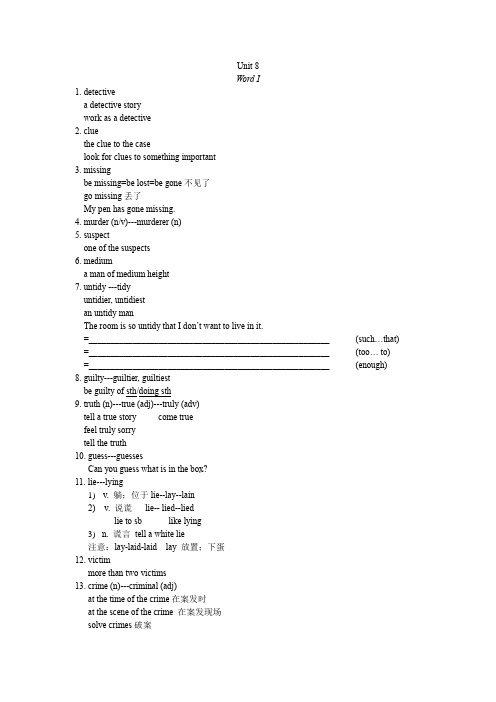
Unit 8Word I1. detectivea detective storywork as a detective2. cluethe clue to the caselook for clues to something important3. missingbe missing=be lost=be gone不见了go missing丢了My pen has gone missing.4. murder (n/v)---murderer (n)5. suspectone of the suspects6. mediuma man of medium height7. untidy ---tidyuntidier, untidiestan untidy manThe room is so untidy that I don’t want to live in it.=_______________________________________________________ (such…that) =_______________________________________________________ (too… to) =_______________________________________________________ (enough) 8. guilty---guiltier, guiltiestbe guilty of sth/doing sth9. truth (n)---true (adj)---truly (adv)tell a true story come truefeel truly sorrytell the truth10. guess---guessesCan you guess what is in the box?11. lie---lying1)v. 躺;位于lie--lay--lain2) v. 说谎lie-- lied--liedlie to sb like lying3)n. 谎言tell a white lie注意:lay-laid-laid lay 放置;下蛋12. victimmore than two victims13. crime (n)---criminal (adj)at the time of the crime在案发时at the scene of the crime 在案发现场solve crimes破案be guilty of computer crimes14. somewhere adv.在某处hide somewherego somewhere elselive somewhere nearbynowhere, everywhere15. contactcontact sb on+号码=call sb on…contact sb at+邮箱=e-mail sb at…16. wound(v) ---wounded (adj) 受伤的be wounded with a knife/guna wounded wolf17. bleed (v)-bled-bled 流血,出血bleed to deathblood (n)(U) 血18. enemy ---enemiesAn enemy says or acts against you.make him some enemies 使他树敌19. single1)=not married He is single all his life.2)=only one a single wordHe passed away peacefully without a single word.20. well-paida well-paid jobwell-knownwell done well dressed21. chargecharge sb with (doing) sth 控告某人犯有…charge him with a murdercharge him with breaking into several computer systems22. break into (有被动)break into a bankbreak out 爆发(无被动)break down 毁坏,出故障(无被动)23. suppose 认为,推断,料想1) =think/consider2) be supposed to do sth=should do sth 理应做某事You should work hard.= You are supposed to work hard.3) I suppose+句子:否定前置类似的有think, believe I don’t suppose he will come tomorrow.24. only唯一的the only + n单数仅有的only a few, only a little25. witness---witnessesa witness to the car accident26. report1) v. report sb sth=report sth to sbIt is/was reported (that) +句子据报道…2) n. give sb a report on sth3) reporter (n) 记者27. breathe (v)---breath (n)be out of breath=breathe heavily 上气不接下气hold one’s breath 屏住呼吸take a deep breath=breathe deeply28. heavily ---more ~, most ~rain hard/ heavilysnow hard/ heavilyblow hard/ stronglya heavy rain/snow29. rewardoffer sb a reward of….给某人……样的一个酬劳offer him a reward of 10, 000 dollarsgive sb sth as a reward30. arrest (n/v)lead to the arrest of sbbe arrested=be under arrest被捕31. coupleAn elderly couple are talking there.a couple of days 两天32. fingerprintcheck the scene for fingerprints33. probably=perhaps=maybe34. criminal (adj.)have a/no criminal record35. female---malea female wolfa female writer/detective36. boss---bossesthe boss of a companymitted--committingcommit murderguilty adj. 有罪的commit v. 犯罪crime n. 犯罪活动,罪行criminal adj. 犯罪的,犯法的n. 罪犯(指人)38.do sth in a hurry =hurry to do sthhurried hurryingWelcome1. be dressed like that穿成那样dress: be dressed in +衣服=have…on=wear …=be in…dress sb/oneselfdress up as a ghost 装扮成鬼be well dressed 穿着体面2. make notes on sb给某人做笔录3. work in a hospitalbe ill in hospital4. Discuss who you think is most likely to be the murderer.be most likely to …最有可能做某事5. Who do you think is not telling the truth?=Do you think who is not telling the truth?6. He looks untidy, ______?Reading II1. early todayearly this morning2. He is two years old.He is a two-year-old boy.an 8/11-year –old girl3. police 集体名词前有the,后面动词用复数; 表示个体用policemancall the policethe police stationsome/many/three policemen4. be seen doing sth---see sb doing sthbe seen to do sth----see sb do sthHe was seen _____ (drive) somewhere at eight last night.5. He said he was going to visit his parents. 过去将来时was/were going to dowould do …The teacher told us that we would have an English test the next week.6. take place:发生,举行=be heldhappen: 偶然发生7. between…and…:动词短暂性、延续性均可from…to…: 动词要延续8. bring sb to sp bring---brought---brought9. at the place where he was found定语从句:代指上文中人用who/that 物: which/that 时间:when地点:where 某人的:whoseShe is the girl whose father is our teacher.Do you know Hai’an where I was born?10. a chief engineer/detectivea general manager11. as a result结果The victim was wounded with a knife. As a result, he bled to death.as a result of…12. if 从句中用any不用some13. in the past:一般过去时in the past+一段时间:现在完成时Grammar定语从句先行词:被修饰的那个词(名词,代词)关系代词:引导定语从句的词代指人:who/that代指物:which/that*定语从句的谓语动词的单复数取决于先行词的单复数Look at the trees which/that were very small last year.Do you know the man who is standing at the school gate?*只能用that1. 先行词为指物的不定代词something, anything, nothing, everything2. 先行词被序数词修饰He was the first student that got to the classroom this morning.3. 最高级4. 先行词有人又有物定语从句(补充)1.先行词被the only, the very, the same , the last, little, few 等词修饰时,只能用that, 而不用which.This is the same bike that I lost.2.只能用which, 不能用that1) 先行词为that, thoseWhat’s that which is on the desk?2) 关系代词前有介词This is the room which he lives in.Here is the man who/whom I often talk to.3.Now we have ten classes which ____ (learn) French.He is the man who ____ (be) value to the people.1. mention提及Don’t mention it. 回答thank you2. the elder couplecouple 做主语,动词为复数形式3. have sth to do with…与……有关4. write detective stories5. require/need sb to do sth6. check every tiny detail for possible clues to the criminal cases7. a master at solving crimes破案能手8. appear in a cartoon series9. be popular among/with sb10. teenagers all over /around the world11. a female writer12. be considered (as) the queen of crime novels13. a knife which was covered in blood 一把布满血迹的刀be covered in deep snowbe covered with14. a rubbish bin15. the drawing of the person这个人的画像put up a drawingWords II1. kidnapping (n)kidnap (v)---kidnappedkidnapper (n)be guilty of kidnappingbe charged with kidnappingcommit kidnapping2.wealth (n)wealthy(adj)---wealthier, wealthiesta wealthy/rich man =a man of great wealth3. prisonin prison 坐牢out of prison出狱work in a /the prisonput sb into prisongo to prison去坐牢4. safety (n)---safe (adj)---safely (adv)some safety tipsfor one’s safetytake sb to safetyfood safety5. lock1) v. lock the door be locked2) n. the lock to the door6.shut---shut---shut shuttingshut=close: shut all the doors shut your mouth7. guardguard against any possible danger around us8. necklacea gold necklace9.theft (n) 偷窃thief (n) 小偷,贼He is under arrest for theft.10. 1) get on/along well with sb与某人相处融洽---How are you getting along with them?---Very well.2) How are you getting on with your English? ……进展如何?11. steal---stole---stolensteal sth from sb steal some valuable jewelry1. a report on the kidnapping case2. sometime: 某时sometimes:有时some time:一段时间some times:一些次3. He is 1.1 metres tall.=He is 1.1 metres in height.=His height is 1. 1 metres.4. on the morning of 28 December5. at one’s weddingon one’s wedding dayTask1. get along /on (well) with2.除了except:不包括besides:包括Many students wear glasses besides Helen.Everybody did his homework carefully except Wang Rui.all, nobody, everybody…用exceptalso…用besides3. live next doorHe lives in the flat next to____ (I ).4. do sth for a living=make a living by doing sth做某事去谋生5. come home from work/school6. drop the necklacedrop---dropping, droppedSb drops sth.Sth falls…7. plan to do sth plans for sth8. take sth to the police station9. the next day=the following day=the second day10. be charged with theft11. run from…into a building12. right after the theft13. be under arrest for murder。
剑桥少儿英语二级unit8

剑桥少儿英语二级unit8Unit 8 Who is the winner? 课堂笔记Ⅰ单词1. opposite 例如parked the car opposite the bank. He sits opposite.他坐在对面。
Tom is opposite Mary. 汤母在麻利的对面。
2. odd/even number3. boring4. fun5. naughty6.winner7.problem8.geese9.potⅡ重点句子1.Whose turn is it? 轮到谁了?It’s my turn. 轮到我了。
2.What have you got in your bag? An eraser, a pen and a lot of books.3.-----How many desks are there in your classroom?-----There are 20 desks in our classroom.4.-----There is a clock in the bedroom.-----There are three people in my family.5.如何介绍自己?Do part7My name is _______. I’m _____ years old. I like _________(如playing computer games/ singing songs/ listening to music/ watching TV/ reading books~~). My favourite food is ________. My favourite fruit/friend/colour/clothers/book is _________,Good morning, my dear friends. Today, let’s play a game. Who wants to be the winner? Look at your books on page43. There are fifty questions for each of you. Now you can play the game. If you have any questions, you can ask me in English, and I can help you.1.Start---5+2---red+white(red+black=gray red+white=pink red+yellow=orange)------b_g----colour it blue.---- say it.(hat)----say it. (cap)----say it and copy it.(cup)---say it.(glasses)--- say it. (window)---guess and draw. It’s round. It’s very very hot.(the sun)---draw a red star here.----odd one out.---this is a ___-----who is happy?---point ast the short man.---what are in the shoes?(spider)---guess and draw. It’s a long animal with no legs.(snake)—what is it?(parrot)---what’s missing?---make a word.---colour it yellow.---how many?---guess and draw. You sleep in this. (quilt)—what’s this?—say 3 words with an “ar’ sound. (park, dark, yard, farther, farm, market)----tick the one you like.---circle your age.-----colour the ball on the chair black.---write your best friend’s name here.---tick the picture. your teacher is tall or short.---got a pet? Draw it.---name this!—match them.—cross out the unhealthy food.--- _gg.---which is a boy?---say 5 animals.---draw them. You see things with these.(eyes)---find the yellow bee on a red flower.---say the opposite.---say the opposite.---say the opposite.--_a_ make some words.-----what’s your favorite food? What things can be red?----which would you like? tick it.---say the last four letters of the alphabet.---count1-50.2. Part2 listen, draw and colour. 提醒共画七件东西,注意间隔,先听录音。
英语第八单元笔记
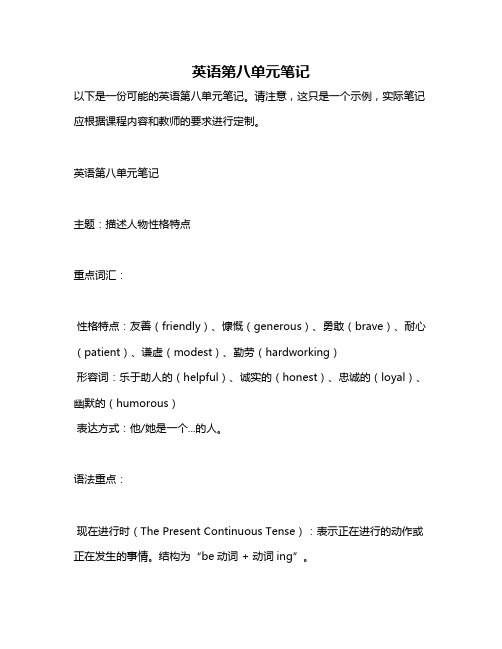
英语第八单元笔记以下是一份可能的英语第八单元笔记。
请注意,这只是一个示例,实际笔记应根据课程内容和教师的要求进行定制。
英语第八单元笔记主题:描述人物性格特点重点词汇:性格特点:友善(friendly)、慷慨(generous)、勇敢(brave)、耐心(patient)、谦虚(modest)、勤劳(hardworking)形容词:乐于助人的(helpful)、诚实的(honest)、忠诚的(loyal)、幽默的(humorous)表达方式:他/她是一个...的人。
语法重点:现在进行时(The Present Continuous Tense):表示正在进行的动作或正在发生的事情。
结构为“be动词 + 动词ing”。
描述人物性格时,使用现在进行时可以强调人物的性格特征是持续的、经常表现出的。
例句:He is being friendly.(他很友好。
)She is always generous with her time.(她总是很慷慨地给予时间。
) He is being brave in the face of difficulties.(他在困难面前表现得很勇敢。
)They are being patient with the elderly.(他们对老年人很有耐心。
) He is being modest about his achievements.(他对自己的成就很谦虚。
)She is hardworking and never gives up.(她很勤劳,从不放弃。
)练习:1. 描述你的一位朋友,使用现在进行时描述他/她的性格特点。
2. 写一篇短文,描述你的一位家人,强调他/她的性格特点。
使用至少5个形容词和2个现在进行时的句子。
五年级上册英语翼教版第八课课堂笔记
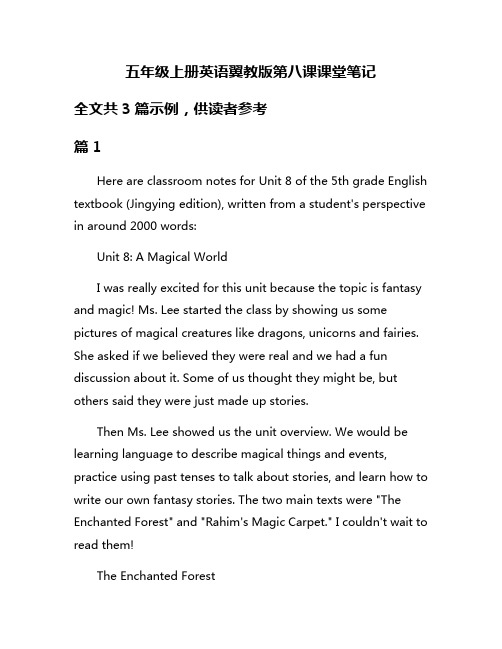
五年级上册英语翼教版第八课课堂笔记全文共3篇示例,供读者参考篇1Here are classroom notes for Unit 8 of the 5th grade English textbook (Jingying edition), written from a student's perspective in around 2000 words:Unit 8: A Magical WorldI was really excited for this unit because the topic is fantasy and magic! Ms. Lee started the class by showing us some pictures of magical creatures like dragons, unicorns and fairies. She asked if we believed they were real and we had a fun discussion about it. Some of us thought they might be, but others said they were just made up stories.Then Ms. Lee showed us the unit overview. We would be learning language to describe magical things and events, practice using past tenses to talk about stories, and learn how to write our own fantasy stories. The two main texts were "The Enchanted Forest" and "Rahim's Magic Carpet." I couldn't wait to read them!The Enchanted ForestThis was such an imaginative story about a girl named Lily who discovers a magical forest near her house. As we read each part, Ms. Lee had us stop and discuss what we thought might happen next. We practiced using phrases like "might be able to", "could possibly", and "it seems like" to make predictions.My favorite part was when Lily met the talking tree! I would be so amazed if a tree started speaking to me. We learned how to use quotations to show direct speech. For example: The tree said, "Welcome to the Enchanted Forest, Lily."After reading, we did an activity where we had to recount the major events in the correct sequence using past tense verbs like "went", "saw", "met", etc. It really helped cement the storyline in my mind.Rahim's Magic CarpetThis story was about a young boy who finds an old carpet that can actually fly! Ms. Lee pointed out descriptive language the author used, like "tattered and worn" and "the carpet rose slowly into the air." We had to find other examples of vivid descriptions.The best part was when Rahim flew over the city and could see all the buildings and cars looking tiny below. We discussedwhat we would do if we had a magic carpet. I said I would fly over to a tropical island for vacation!For grammar, we learned about using different past tenses together, like simple past "Rahim found the carpet" and past continuous "he was exploring in the attic." We did substitution drills switching between the tenses. It was challenging but good practice.Writing a Fantasy StoryFor the unit writing task, we had to develop our own original fantasy story featuring magical elements. Ms. Lee gave us a structure to follow:Introduction of main character and settingThe magical encounter or discovering magicEvents and obstacles because of the magicResolution and endingI decided my story would be about a girl who finds a spell book and accidentally turns her little brother into a frog! Then she has to go on a quest to find ingredients to reverse the spell. Along the way, there would be challenging run-ins with other magical beings and places.Ms. Lee had us spend a few classes just doing prewriting - brainstorming ideas, creating character profiles, and outlining the plot sequence. Then we worked on drafting and revising our stories, focusing on descriptive language and consistent verb tenses.I really enjoyed exercising my creativity for this assignment! Sharing our stories was the highlight at the end of the unit. I was amazed by the imaginative worlds my classmates came up with using the techniques we learned.Overall, Unit 8 was a delightful journey into fantasy and magic. I feel more confident now in my ability to narrate sequences of events, make predictions, and craft engaging stories. On to the next unit's adventure!篇2Here are classroom notes for Unit 8 of the 5th grade English textbook (Jingying Edition), written from a student's perspective in English (around 2000 words):Unit 8: A Taste of Chinese CultureClass notes by [Your Name]Today in English class, we started a new unit all about Chinese culture! I'm really excited because I love learning about the rich traditions and history of our country. Mrs. Wang said we'd be exploring different aspects of Chinese culture through readings, videos, activities and even some cooking. Yum!Reading: The Dragon Boat FestivalWe began by reading a passage about the Dragon Boat Festival, which is celebrated annually on the 5th day of the 5th month on the Chinese lunar calendar. Some key points:It commemorates the life and death of the famous poet Qu Yuan who lived around 300 BCPeople race dragon boats, which are long boats brightly painted with a dragon head at the frontFamilies prepare and eat zongzi - sticky rice dumplings wrapped in bamboo leavesThey also hang up plants like calamus, goldthread and moxa to repel insects and evildoersI didn't know the Dragon Boat Festival had such ancient origins! The racing and symbolism with the dragon boats sounds really exciting. I can't wait to try making zongzi.Vocabulary:We learned some great new vocabulary words from the reading:commemorate, calamus, goldthread, moxa, repel, evildoerMrs. Wang had us practice using them in sentences. For example:The town commemorates its founding with a big festival every year.I will hang up moxa plants to help repel mosquitoes this summer.Video: The Traditions of the Dragon Boat FestivalNext we watched a short video showing how the Dragon Boat Festival is celebrated around China today. I saw:The colorful dragon boat racing competitionsFamilies preparing zongzi togetherPeople drinking realgar wine, eating rice pudding and other festive foodsHanging up symbolic decorations like moxa and calamus plantsThe racing looked so fun and competitive! I loved seeing the rowers paddle in sync to the rhythmic drumbeats. Making the zongzi dumplings also seemed like a nice family tradition to spend time together. I can't wait to celebrate this holiday.Speaking Activity: Explaining a FestivalFor the speaking portion, Mrs. Wang put us in small groups and had each person explain a different Chinese festival to their group members. I was assigned the Mid-Autumn Festival.I explained:When it takes place (the 15th day of the 8th lunar month, usually September)Popular traditions like eating mooncakes, carryingbrightly-lit lanterns, and enjoying the full moonThe festival's origins from ancient myths and moon worshipMy groupmates asked lots of good follow-up questions about things like what goes inside mooncakes. Speaking practice really helps improve my English skills.Reading Comic StripsAs a fun way to work on reading comprehension, we read through some short comic strips related to Chinese culture. Onewas about a kid trying to put on a Beijing Opera mask and make-up. Another showed a family making dumplings together for the New Year.The comic strips had very descriptive language and idioms that made them challenging but interesting to decipher. I like how they combined visuals with the English text to help convey the cultural concepts.Overview of Homework:For homework this week, we have a few assignments related to this unit:Write a short essay describing your favorite Chinese festival and traditionsResearch and create a fact sheet about one aspect of Chinese culture (food, clothing, arts, etc.)Prepare a show-and-tell item or demonstration related to our unit for next classI'm going to make a fact sheet all about the fascinating history and styles of Beijing Opera, complete with pictures and key vocabulary words. For show-and-tell, maybe I'll demonstrate how to fold a simple dumplings or origami figure.I really enjoyed our first dive into this engaging new unit! Learning about the diversity of Chinese cultural traditions is not only interesting, but helps me appreciate the richness of our heritage. I'm looking forward to soaking up more knowledge and having some hands-on experiences in the coming weeks. Studying English while exploring my own culture is a fun way to make the lessons meaningful.篇3Here are classroom notes for Unit 8 of the 5th grade English textbook (Jingying Edition), written from the perspective of a student in around 2000 words:Unit 8: On the Way to SchoolClass Notes:Today in English class, we started a new unit all about going to school. Ms. Lee introduced some new vocabulary words related to transportation and school routines.First up were words for different vehicles:Bike - A two-wheeled vehicle that you pedalBus - A big vehicle that carries lots of passengersCar - A four-wheeled vehicle that a family usesTrain - A vehicle on railways with multiple connected carriagesPlane - A vehicle that flies through the airWe practiced saying and spelling these new words. Some are easy like "car" but others like "vehicle" have tricky letter combinations.Next, we learned phrases describing how we get to school:Take the busRide a bikeWalk to schoolGet a ride (when parents drive you)Catch the trainI take the bus to school every morning. It's kind of a long ride, around 30 minutes. My best friend Erik rides his bike most days since he lives pretty close. We talked about our different routines.After transportation vocabulary, we moved on to words about school schedules and routines:Get up early - To wake up before most people, like 6 or 7 AMGet ready - Activities like brushing teeth, getting dressed, etc.Rush out the door - To leave home very quickly without much timeBe on time - To arrive at the correct scheduled time, not lateMorning routine - The things you do every morning before leavingMy morning routine is pretty standard. I get up at 6:30 AM, brush my teeth, get dressed, eat breakfast, and then rush to catch the bus by 7:20. Getting ready on time is always a challenge! I'm often running late.For practice, Ms. Lee had us write out our entire morning routines from waking up to arriving at school. We used the new vocabulary words as much as possible. Here's what I wrote:"I get up at 6:30 every morning. First, I brush my teeth and get dressed. Then I go downstairs and eat breakfast quickly. At 7:15, I rush out the door to wait for the bus. I can't be late! The bus arrives at 7:20 and I take the bus to school. I usually get to class right before the bell rings at 8 AM."After writing, we paired up to discuss each other's routines. Erik and I compared how we get ready and get to schooldifferently. Even though we're friends, our morning routines are quite different!To wrap up the class, Ms. Lee taught us a new song called "On the Way to School." It repeats lots of the transportation phrases we learned. The chorus goes:"On the way to school, on the way to school,Taking the bus or riding my bike,Walking along or catching a ride,Off to school, Off to school!"We all sang along and did hand motions for the different vehicles. It's a really catchy, fun song to help remember the new vocabulary.For homework, we have to write about our dream way to get to school. How would we want to travel if we could? Maybe by helicopter, jetpack, or even teleportation? I'm excited to use my imagination and writing skills for this assignment.Overall, it was an engaging first lesson for Unit 8. I feel like I learned a lot of useful words and phrases about transportation and morning routines. Singing the song together was a high point. Can't wait for the next class!。
八年级下册英语第八单元3a笔记

八年级下册英语第八单元3a笔记摘要:一、前言二、八年级下册英语第八单元3a 课文概述三、课文重点词汇和短语四、课文难点解析五、课文练习答案六、总结与反思正文:一、前言在八年级下册英语的第八单元中,我们学习了关于旅游的话题。
本篇文章通过一个旅行日记的形式,描述了一对夫妇在意大利的旅行经历。
通过学习这篇课文,我们不仅能了解到意大利的一些著名景点,还能学习到一些与旅游相关的英语表达。
二、八年级下册英语第八单元3a 课文概述本篇课文讲述了主人公Tom 和他的妻子Sue 在意大利度过的一个美好假期。
他们游览了罗马、佛罗伦萨和威尼斯等著名城市,欣赏了各种美丽的风景和历史遗迹。
在旅行过程中,他们品尝了当地的美食,体验了丰富的文化,还遇到了一些有趣的事情。
三、课文重点词汇和短语1.scenic beauty 风景秀丽2.historical landmark 历史遗迹3.gondola 贡多拉4.cuisine 美食5.cultural experience 文化体验6.picturesque 风景如画的四、课文难点解析1.Tom 和Sue 在旅行中使用了哪些交通工具?答:他们使用了飞机、出租车、火车和贡多拉。
2.他们在意大利游览了哪些城市?答:罗马、佛罗伦萨和威尼斯。
3.他们是如何描述罗马的?答:他们用“ancient”来形容罗马,表示这是一个充满历史的城市。
4.他们在佛罗伦萨参观了哪个著名景点?答:他们参观了乌菲齐美术馆。
5.他们在威尼斯乘坐了什么交通工具?答:他们乘坐了贡多拉。
五、课文练习答案略。
六、总结与反思通过学习这篇课文,我们不仅能够了解到意大利的一些著名景点和风土人情,还能学习到一些与旅游相关的英语词汇和表达。
八年级上册u8笔记

八年级上册u8笔记
以下是八年级上册Unit 8的笔记,供您参考:
1. 重点单词:掌握课本中的重点单词,包括它们的拼写、发音和用法。
2. 语法点:掌握一般现在时、现在进行时和一般过去时的用法,特别是动词的第三人称单数形式和动词的-ing形式。
3. 常用表达法:掌握一些常用的表达法,如询问对方正在做什么,询问对方是否在做某事等。
4. 课文理解:理解课文中的对话和短文,掌握其中的重点词汇和表达法。
5. 练习巩固:通过练习巩固所学知识,提高自己的语言运用能力。
6. 听力训练:通过听力训练提高自己的听力水平,掌握一些常用的听力技巧。
7. 口语训练:通过口语训练提高自己的口语表达能力,掌握一些常用的口语表达方式。
以上是Unit 8的主要学习内容,建议您在学习过程中认真听讲,及时总结
笔记,多做练习,提高自己的语言运用能力。
unit8五上课堂笔记
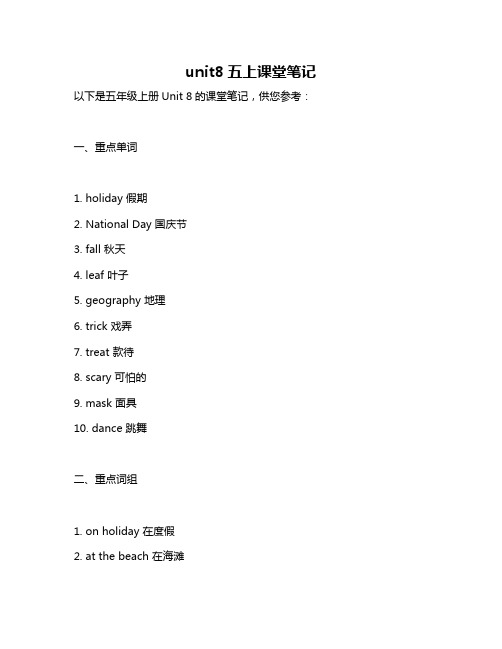
unit8五上课堂笔记以下是五年级上册Unit 8的课堂笔记,供您参考:一、重点单词1. holiday 假期2. National Day 国庆节3. fall 秋天4. leaf 叶子5. geography 地理6. trick 戏弄7. treat 款待8. scary 可怕的9. mask 面具10. dance 跳舞二、重点词组1. on holiday 在度假2. at the beach 在海滩3. in the mountains 在山里4. in the fall 在秋天5. go leafleting 传单散发6. have fun 玩得开心7. play a trick on sb 戏弄某人8. have a treat 享受款待9. wear a mask 戴面具10. do the hokey pokey 跳圈圈舞三、重点句型1. What are you doing on your holiday? 你假期打算做什么?2. We are going to the beach to play in the sand and swim in the sea. 我们打算去海滩玩沙子和在海里游泳。
3. There are so many people here! 这里人真多!4. It is fun to do this with my family and friends. 和家人和朋友一起做这个很有趣。
5. I am going to the mountains to hike and see beautiful fall leaves. 我打算去山里远足和看美丽的秋叶。
6. I will play a trick on my friend and scare him. 我要戏弄我的朋友并吓唬他。
7. Let's have some treats and snacks before we go to the party. 在我们去派对之前,让我们享受一些款待和小吃。
英语书五年级上册第八课笔记
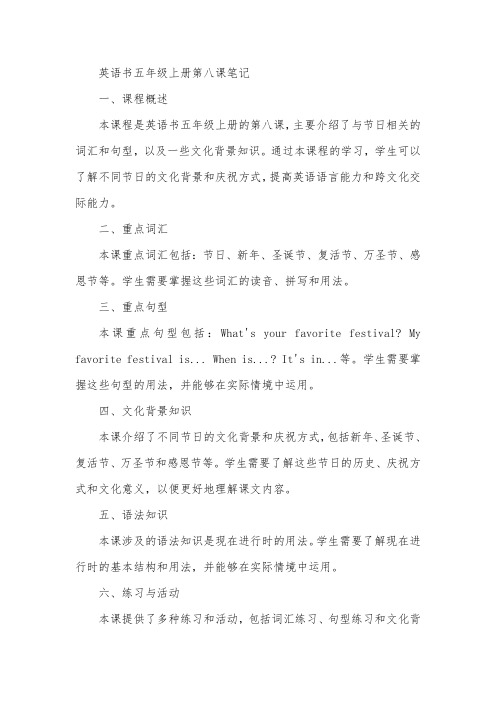
英语书五年级上册第八课笔记
一、课程概述
本课程是英语书五年级上册的第八课,主要介绍了与节日相关的词汇和句型,以及一些文化背景知识。
通过本课程的学习,学生可以了解不同节日的文化背景和庆祝方式,提高英语语言能力和跨文化交际能力。
二、重点词汇
本课重点词汇包括:节日、新年、圣诞节、复活节、万圣节、感恩节等。
学生需要掌握这些词汇的读音、拼写和用法。
三、重点句型
本课重点句型包括:What's your favorite festival? My favorite festival is... When is...? It's in...等。
学生需要掌握这些句型的用法,并能够在实际情境中运用。
四、文化背景知识
本课介绍了不同节日的文化背景和庆祝方式,包括新年、圣诞节、复活节、万圣节和感恩节等。
学生需要了解这些节日的历史、庆祝方式和文化意义,以便更好地理解课文内容。
五、语法知识
本课涉及的语法知识是现在进行时的用法。
学生需要了解现在进行时的基本结构和用法,并能够在实际情境中运用。
六、练习与活动
本课提供了多种练习和活动,包括词汇练习、句型练习和文化背
景知识问答等。
学生需要通过这些练习和活动巩固所学知识,提高英语语言能力和跨文化交际能力。
七、总结与反思
本课介绍了与节日相关的词汇和句型,以及一些文化背景知识。
学生需要掌握这些词汇和句型的用法,并能够在实际情境中运用。
同时,学生也需要了解不同节日的文化背景和庆祝方式,以便更好地理解课文内容。
在未来的学习中,学生需要继续努力提高英语语言能力和跨文化交际能力。
八上英语书第八单元笔记

八上英语书第八单元笔记
第八单元是关于"Health"(健康)的。
在这个单元里,我们学
习了关于健康和生活方式的词汇和表达,以及如何描述身体部位的
词汇。
我们还学习了如何描述疾病和症状,以及如何给出建议和表
达感受。
在这个单元里,我们还学习了一些关于保持健康的方法和
建议,以及如何描述日常生活中的活动和饮食习惯。
在课文中,我
们也学习了一些关于健康生活的习惯和建议,以及如何表达自己的
看法和建议。
在这个单元里,我们还学习了一些与健康相关的语法,比如如
何使用情态动词来表达建议和义务,以及如何使用情态动词来表达
推测和可能性。
我们还学习了一些关于条件句和时间状语从句的用法,以及如何使用副词来描述频率和程度。
总的来说,这个单元主要是围绕健康和生活方式展开的,我们
学习了很多关于健康的词汇和表达,以及如何描述疾病和症状,以
及如何给出建议和表达感受。
同时,我们也学习了一些与健康相关
的语法知识,比如情态动词的用法,条件句和时间状语从句的用法,以及副词的用法。
这些知识对我们理解和表达关于健康和生活方式
的话题非常有帮助。
希望这些笔记对你有所帮助。
八上英语8单元笔记
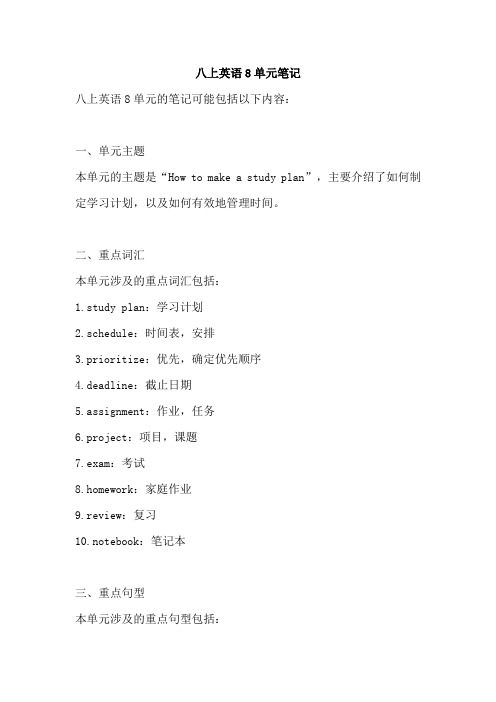
八上英语8单元笔记八上英语8单元的笔记可能包括以下内容:一、单元主题本单元的主题是“How to make a study plan”,主要介绍了如何制定学习计划,以及如何有效地管理时间。
二、重点词汇本单元涉及的重点词汇包括:1.study plan:学习计划2.schedule:时间表,安排3.prioritize:优先,确定优先顺序4.deadline:截止日期5.assignment:作业,任务6.project:项目,课题7.exam:考试8.homework:家庭作业9.review:复习10.notebook:笔记本三、重点句型本单元涉及的重点句型包括:1.How do you usually make a study plan? 你通常如何制定学习计划?2.I usually make a schedule to manage my time. 我通常制定时间表来管理我的时间。
3.What do you usually do first when making a study plan? 在制定学习计划时,你通常首先做什么?4.I usually prioritize my assignments and homework. 我通常优先处理作业和家庭作业。
5.When is the deadline for your project? 你的项目的截止日期是什么时候?6.How do you usually review your notes? 你通常如何复习笔记?What is your favorite study tool? 你最喜欢的学习工具是什么?7.Do you use a notebook for your studies? 你学习时使用笔记本吗?四、语法知识点本单元涉及的语法知识点包括一般现在时和现在进行时的用法。
通过例句和练习,学生可以进一步巩固这些语法知识。
五、文化知识点本单元还涉及了一些文化知识点,如不同国家的学习方式和时间管理方式。
- 1、下载文档前请自行甄别文档内容的完整性,平台不提供额外的编辑、内容补充、找答案等附加服务。
- 2、"仅部分预览"的文档,不可在线预览部分如存在完整性等问题,可反馈申请退款(可完整预览的文档不适用该条件!)。
- 3、如文档侵犯您的权益,请联系客服反馈,我们会尽快为您处理(人工客服工作时间:9:00-18:30)。
Unit 8 课堂笔记1一般过去时概念:_______________________________________________构成:_______________________________________________动词的过去式的变化规则1一般直接加_____________________2以_______结尾,直接加__________3末尾只有一个辅音字母的________________词,___________________________4_______________________________________ ___,变y为i再加______________________.写出下列动词的过去式am/is_______are_______ have/has_______ do/does_______ go-_______, eat_______ hang_______ see_______ buy_______ win_______ get_______ meet_______ take_______ sleep_______come_______ put_______ read_______ swim_______ leave_______ bring_______sing_______stand——————1)When _____Jessy ______to New York?---Yesterday.A does getB did getC has gotD had got2)Where is the cake I made this morning?---We_____it.Mom,can you make another one for us?A ateB eatC will eatD were eating3)---It’s dangerous to swim here.Look at the sign.---Oh,I _________notice it.Thanks for telling me.A haven’tB won’tC don’tD didn’t4)---Why are you late again,Grace?---Sorry,sir.I _____again.A went to bed earlyB slept lateC got up earlyD had nothing5)____he go to bed late last night?A IsB WasC DidD Does6)He often _____his homework after supper,but yesterday evening he_______TV.A does watchesB did watchedC did watchesD does watched7)Han Mei _______and______some light music last night.A play singB played sangC plays singsD plays sing8)______you at home yesterday evening?A DidB DoC WasD Were9)---Who cleaned the classroom this morning?--Wei Fang ______.A wasB didC doesD had2hang 意为________________,过去式______________闲逛____________________和某人闲逛______________Tina liked to ______with her friends and _____ice cream.Ahang out has B hang out have C hung out has D hung out have3else 意为______________,常放于__________________________________之__________.联系:else与other的区别:1)你还做了什么?______________________________2)他还去了哪儿?_________________________________3)他们还认识谁?____________________________________4)没有别人会做三明治。
_______________________________5)If you know _______who collects stamps,please call me.A anyone elseB else anyoneC other anyoneD anyone other6)Li Ming runs faster than _______in his class.Aany else student B any student else Canyone else D else anyone7)_____did you do?A What elseB What else thingsC What otherD What others things8)Believe yourself!You’re better than__________.You’re the best.Wish you success!A anyone otherB some elseC else anyoneD anyone else4win意为__________________过去式______________ing形式______________名词_____________赢得比赛_____________游戏获胜________________赢得奖品________________获得一等奖______________赢了一顶帽子__________________beat意为______________过去式__________________,其后常跟__________________注:win与beat的区别:_______________________________________________1)Liu Xiang took part in the 2008 Beijing Olympics,but it’s a pity that he didn’t________ a gold medal.A beatB winC makeD take2)Who _____first prize in yesterday’s speech contest?A winsB did winC wonD will win3)He winned the match at last.(判断并改错)4)Our team ____the match.We’ve got the first place.---Well done!Congratulations!A hitB beatC wonD watched5)Yesterday Jack ____me at chess,and he _____the prize.A beat winB beat beatC won beatD beat won5have a great time=___________________=__________________其后跟______________1)九班的同学在学校旅行中过的很开心。
_________________________________________________2)野营有趣吗?___________________________________________3)They had a lot of fun________beach volleyball together.A playingB to playC playedD play4)---Did you and your friends ride your bicycles to the beach yesterdayafternoon?---Yeah,_______we have!A How a funB What funC What a funD How fun5)I didn’t have fun_____yesterday.Ato skate B skates C skated D skating6)Who ______on the school trip last week?Ahad a great fun Bhad very good timeC had great funDenjoy themselves6on 表_______________在学校旅行中______________在度假______________在我的休假中______________在我的上次休假中______________在我的下次休假中______________1)What will you do _____your next day off?A inB forC onD at2)They had a great time on the school’s trip.(判断并改错)7buy意为_____________过去式____________三单______________ 给某人买某物______________________1)午饭后,他们去礼品店买了很多的礼物。
_____________________________________2)你为你妈妈买东西了吗?_______________________3)你买了些什么呀?_____________________________4)他为我买了一些面包。
______________________________5)---Why are you in such a hurry,Meimei?---The fashion clothes are ______in thesupermarket at the moment.A boughtB have saleC onD selling8end意为___________还可用作________词,意为_____________在…的结尾/尽头____________________反义词组________________________在年终_________________在故事的结尾________________________1)在那天结束时,科学老师很高兴,因为班长在旅游结束后清扫了公共汽车。
